Please fill out the following information, and RRFC Admissions will contact you to discuss our program offerings:
Issue #216
by Liya Swift
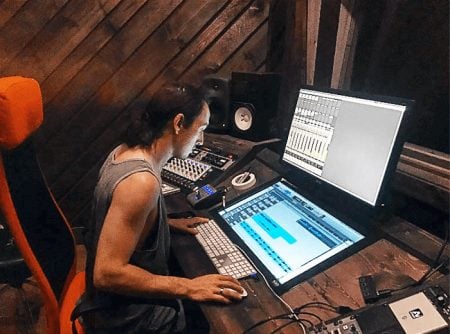
Recording Connection graduate Nigel Dean
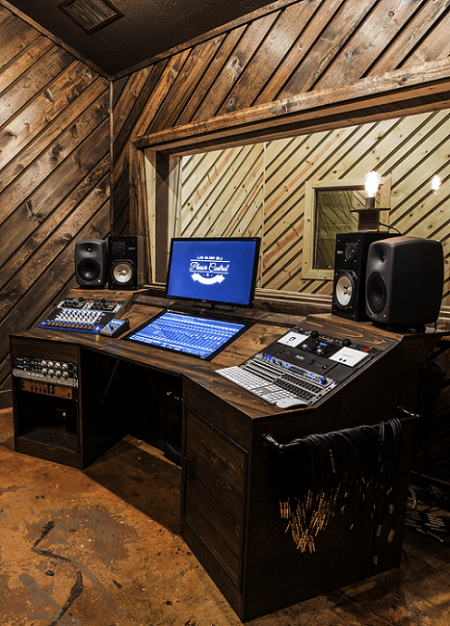 And even though you’re a multi-instrumentalist and have been writing songs all your life, you didn’t really know any of the DAWs when you signed up, right?
“Not really. I mean, I had Logic, and I knew a little bit through that. I had been messing with it for like three months. That was the whole reason I enrolled in Recording Connection…To me it was like, I could figure it all out myself or I could save myself a bunch of time, maybe spend a little money and learn from somebody and just cut that corner so that I could excel quicker. That’s basically what I ended up doing.
I did my whole apprenticeship (externship) so that I didn’t have to do this long studying by myself independently. If I was studying by myself, I could be learning something totally wrong instead of having Patrick there to say, ‘I know that the internet tells you that this is what you do, but it’s not.’
When I met Patrick what I lacked was the fundamental understanding of what mixing even was…I mean my tracks sounded great in terms of composition but in terms of sound, they sounded muddy. So he opened the door on how to clean everything up, how to make sure everything has its own space within the frequency spectrum, that everything is cohesive as a whole. Then, he really explained to me the technological aspects: how different types of microphones work, the essentials of certain equipment, and basically the fundamental components of what the equipment does.”
Ultimately you got hired but prior to that, Patrick asked you to come in to help on certain projects. Yes?
“Yeah. I got to sit on some projects where I was the assistant engineer and similar things where I helped produce. I even had some sessions where I was the session guitarist. I’ve gotten to work with some really amazing artists that I would never have dreamed about working with. Some of them were my idols growing up as a kid. Luckily, after the program was done, he continued to hit me up and say, ‘Hey man, I need help with this.’… Then finally one day he was like, ‘Hey man, you’re here enough. You might as well just be one of us.’”
In your opinion, what do students need to do to make the most of their experiences with Recording Connection?
“Number one, they have to have an exceptional work ethic. The mentors can guide you places but they can’t make you move your legs. For anybody who’s trying to enroll, one thing that they need to know in their head is that this is the hardest work ever, in my opinion, or one of the hardest. Any entertainment industry job, whether it be acting or standup comedy or whatever, it’s nonstop. The only time you really get time to yourself is when you’re sleeping at night. So I think any student needs to go into it knowing that this is going to be hard work.”
Okay, it’s hard work but you seem to love what you’re doing.
“Oh, totally… It’s some kind of euphoria. That’s what keeps me going, honestly.”
How does it feel to now be able to go home, play your guitar, record it, track the whole thing and mix it yourself?
“It’s an amazing feeling. There’s nothing I can’t do now, which is one of the greatest things ever, [to be] a musician and an engineer and all that. I’m confident that anything that I want to do musically, I can do it now. There’s no limitations.”
And even though you’re a multi-instrumentalist and have been writing songs all your life, you didn’t really know any of the DAWs when you signed up, right?
“Not really. I mean, I had Logic, and I knew a little bit through that. I had been messing with it for like three months. That was the whole reason I enrolled in Recording Connection…To me it was like, I could figure it all out myself or I could save myself a bunch of time, maybe spend a little money and learn from somebody and just cut that corner so that I could excel quicker. That’s basically what I ended up doing.
I did my whole apprenticeship (externship) so that I didn’t have to do this long studying by myself independently. If I was studying by myself, I could be learning something totally wrong instead of having Patrick there to say, ‘I know that the internet tells you that this is what you do, but it’s not.’
When I met Patrick what I lacked was the fundamental understanding of what mixing even was…I mean my tracks sounded great in terms of composition but in terms of sound, they sounded muddy. So he opened the door on how to clean everything up, how to make sure everything has its own space within the frequency spectrum, that everything is cohesive as a whole. Then, he really explained to me the technological aspects: how different types of microphones work, the essentials of certain equipment, and basically the fundamental components of what the equipment does.”
Ultimately you got hired but prior to that, Patrick asked you to come in to help on certain projects. Yes?
“Yeah. I got to sit on some projects where I was the assistant engineer and similar things where I helped produce. I even had some sessions where I was the session guitarist. I’ve gotten to work with some really amazing artists that I would never have dreamed about working with. Some of them were my idols growing up as a kid. Luckily, after the program was done, he continued to hit me up and say, ‘Hey man, I need help with this.’… Then finally one day he was like, ‘Hey man, you’re here enough. You might as well just be one of us.’”
In your opinion, what do students need to do to make the most of their experiences with Recording Connection?
“Number one, they have to have an exceptional work ethic. The mentors can guide you places but they can’t make you move your legs. For anybody who’s trying to enroll, one thing that they need to know in their head is that this is the hardest work ever, in my opinion, or one of the hardest. Any entertainment industry job, whether it be acting or standup comedy or whatever, it’s nonstop. The only time you really get time to yourself is when you’re sleeping at night. So I think any student needs to go into it knowing that this is going to be hard work.”
Okay, it’s hard work but you seem to love what you’re doing.
“Oh, totally… It’s some kind of euphoria. That’s what keeps me going, honestly.”
How does it feel to now be able to go home, play your guitar, record it, track the whole thing and mix it yourself?
“It’s an amazing feeling. There’s nothing I can’t do now, which is one of the greatest things ever, [to be] a musician and an engineer and all that. I’m confident that anything that I want to do musically, I can do it now. There’s no limitations.”
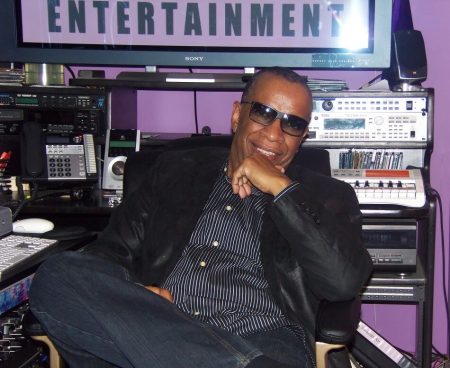
Recording Connection mentor Lee Evans
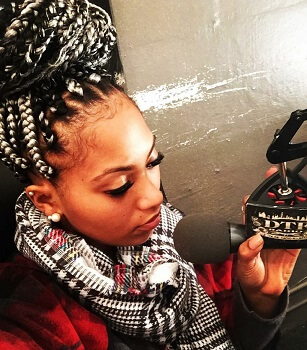 Sending a big congratulations to Radio Connection graduate Leonora “Lelo” Martelly in NYC on recently getting promoted from Talk Programming Producer & Social Media Manager to Board Operations at SiriusXM! Here’s her advice for making the most of Radio Connection:
“I would merely say, be consistent…I mean, not just doing the work when you’re having fun and getting into it, but actually going home and practicing it and applying what you learned so that it gets embedded in your memory and actually becomes natural…Don’t doubt yourself. Believe in yourself even when no one else does, because if they don’t see the vision, then how do you expect them to be as passionate about it as you are? It starts with you…It’s really about being confident, understanding your natural gift, and owning your vision.”
Keep on doing us proud Lelo!
Sending a big congratulations to Radio Connection graduate Leonora “Lelo” Martelly in NYC on recently getting promoted from Talk Programming Producer & Social Media Manager to Board Operations at SiriusXM! Here’s her advice for making the most of Radio Connection:
“I would merely say, be consistent…I mean, not just doing the work when you’re having fun and getting into it, but actually going home and practicing it and applying what you learned so that it gets embedded in your memory and actually becomes natural…Don’t doubt yourself. Believe in yourself even when no one else does, because if they don’t see the vision, then how do you expect them to be as passionate about it as you are? It starts with you…It’s really about being confident, understanding your natural gift, and owning your vision.”
Keep on doing us proud Lelo!
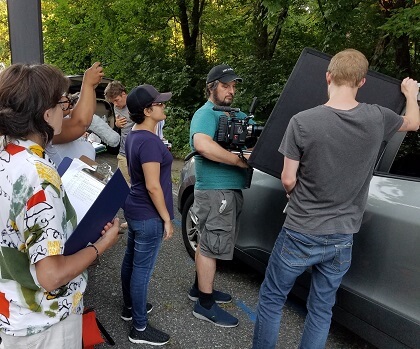 Film Connection student Mike Whitehead, who trains with Rocco Michaluk of Rocco Films, is saying yes to the long days ahead:
“Our session ended with a recap and revisit of my short film, talking about steps taken/completed and what more needs to be done in efforts to prepare for pre-production…The majority of class was going over the revamped short story script and talking about certain elements of what we can make work, some things that may pose a challenge, [and] how we will get done (in a good way)…A ton of homework was given to begin the legwork: scouting locations, compiling a shopping list of props, look-books, research into potential actors, character descriptions/breakdowns…
I’ve dug myself in a deep hole of work to be done in the coming weeks and months and I couldn’t be happier.”
Film Connection student Mike Whitehead, who trains with Rocco Michaluk of Rocco Films, is saying yes to the long days ahead:
“Our session ended with a recap and revisit of my short film, talking about steps taken/completed and what more needs to be done in efforts to prepare for pre-production…The majority of class was going over the revamped short story script and talking about certain elements of what we can make work, some things that may pose a challenge, [and] how we will get done (in a good way)…A ton of homework was given to begin the legwork: scouting locations, compiling a shopping list of props, look-books, research into potential actors, character descriptions/breakdowns…
I’ve dug myself in a deep hole of work to be done in the coming weeks and months and I couldn’t be happier.”
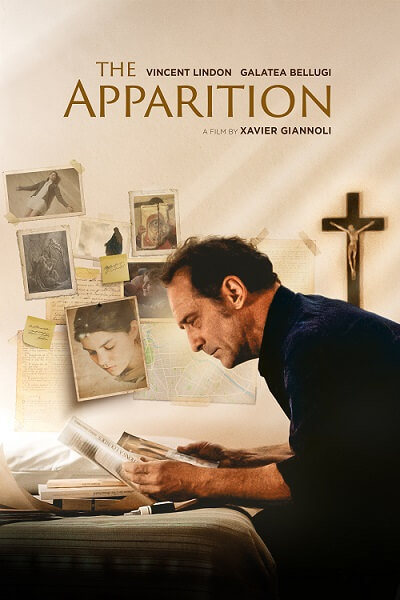 Answer the question below and enter to win 1 pass for you and one guest to attend the opening of The Apparition, on September 7th, 2018 at Laemmle Royal Theater in Los Angeles!
Who’s the Los Angeles-based Film Connection mentor who advises up and coming screenwriters to “focus on what’s commercial” in order to “get on the map” in the film industry?
Hint: He shared this bit of advice in a recent newsletter (see Archives) and is as a writer, director, and producer with more than 20 films to his credit.
Email your answer to [email protected] and include “Apparition Passes” in the subject header.
The Apparition is the new French drama from acclaimed director Xavier Giannoli, starring Vincent Lindon who plays a top French journalist recruited by the Vatican to investigate a young woman’s supernatural vision.
Watch the trailer on YouTube here.
Answer the question below and enter to win 1 pass for you and one guest to attend the opening of The Apparition, on September 7th, 2018 at Laemmle Royal Theater in Los Angeles!
Who’s the Los Angeles-based Film Connection mentor who advises up and coming screenwriters to “focus on what’s commercial” in order to “get on the map” in the film industry?
Hint: He shared this bit of advice in a recent newsletter (see Archives) and is as a writer, director, and producer with more than 20 films to his credit.
Email your answer to [email protected] and include “Apparition Passes” in the subject header.
The Apparition is the new French drama from acclaimed director Xavier Giannoli, starring Vincent Lindon who plays a top French journalist recruited by the Vatican to investigate a young woman’s supernatural vision.
Watch the trailer on YouTube here.
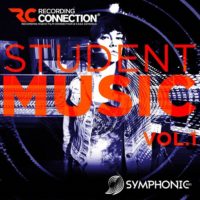 Heard our Student Music Mixtape yet? In partnership with Symphonic Distribution, we’re excited to help our students get their music out to the world!
The Recording Connection is now offering this great opportunity for our students to broaden their understanding of the new role digital distribution companies like Symphonic Distribution can play in helping release their tracks and propel their careers forward!
Heard our Student Music Mixtape yet? In partnership with Symphonic Distribution, we’re excited to help our students get their music out to the world!
The Recording Connection is now offering this great opportunity for our students to broaden their understanding of the new role digital distribution companies like Symphonic Distribution can play in helping release their tracks and propel their careers forward!

RRFC is education upgraded for the 21st century.
Get the latest career advice, insider production tips, and more!
Please fill out the following information, and RRFC Admissions will contact you to discuss our program offerings:
Stay in the Loop: Subscribe for RRFC news & updates!
© 2024 Recording Radio Film Connection & CASA Schools. All Rights Reserved.


